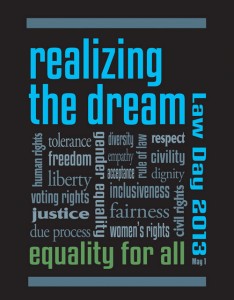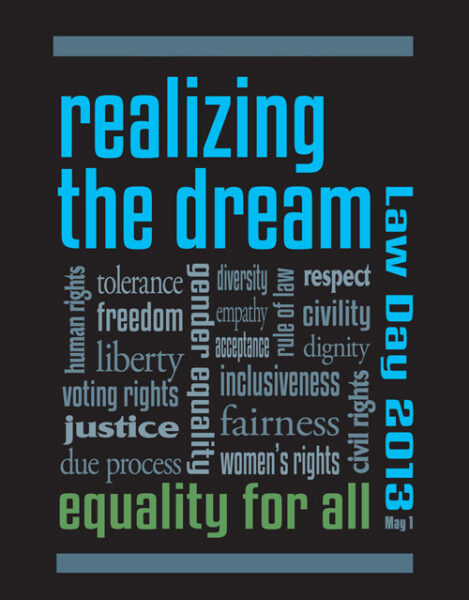By Kelly Tait
 In a year that marks the 150th anniversary of the issuance of the Emancipation Proclamation and the 50th anniversary of Reverend Dr. Martin Luther King Jr.’s “I Have A Dream” speech, the 2013 Law Day theme is particularly apt: “Realizing the Dream: Equality for All.”
In a year that marks the 150th anniversary of the issuance of the Emancipation Proclamation and the 50th anniversary of Reverend Dr. Martin Luther King Jr.’s “I Have A Dream” speech, the 2013 Law Day theme is particularly apt: “Realizing the Dream: Equality for All.”
Law Day was started in 1958 by President Eisenhower to celebrate the rule of law and to educate citizens on how law and legal processes support American freedoms, with an emphasis on the role of courts in our democracy. Law Day is May 1.
The American Bar Association’s Law Day website, www.lawday.org, provides judicial branch educators with some great tools for community outreach. The site is well-organized and provides easy access to numerous resources including the Law Day 2013 planning guide, reflections on the theme and strategies for incorporating it, downloadable artwork, resources and ideas for programming and promotion, and activities for teachers and students. A particular strength of the information provided is the wide range of ideas and tips for reaching different audiences.
Talking points, lesson plans (for all ages), quotations, and film and print resources focus in particular on the serious issues of human trafficking and gender equity.
Ideas for activities that are well-suited to the courts include court tours, information fairs, mock trials, judge “shadowing,” career panels, and book/movie discussions. In addition to the web-based tips, ideas, and resources, the ABA also offers individual assistance through Chandra Fitzpatrick, outreach manager for the ABA Division for Public Education, at (312) 988-5720 or .
As it says on the ABA website: “Law Day, May 1, 2013, will provide an opportunity to explore the movement for civil and human rights in America and the impact it has had in promoting the ideal of equality under the law. It will provide a forum for reflecting on the work that remains to be done in rectifying injustice, eliminating all forms of discrimination, and putting an end to human trafficking and other violations of our basic human rights.”
Kelly Tait is a college instructor and communication consultant with eleven years of experience in judicial branch education. Her areas of expertise include procedural fairness, courtroom communication skills, communicating effectively with non-legally trained court participants, faculty development, and avoiding bias and perceptions of bias. She is Vice President of NASJE and can be contacted at .

